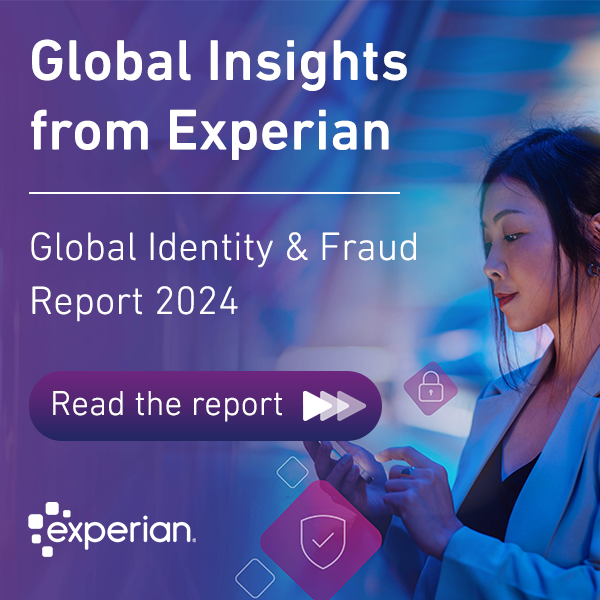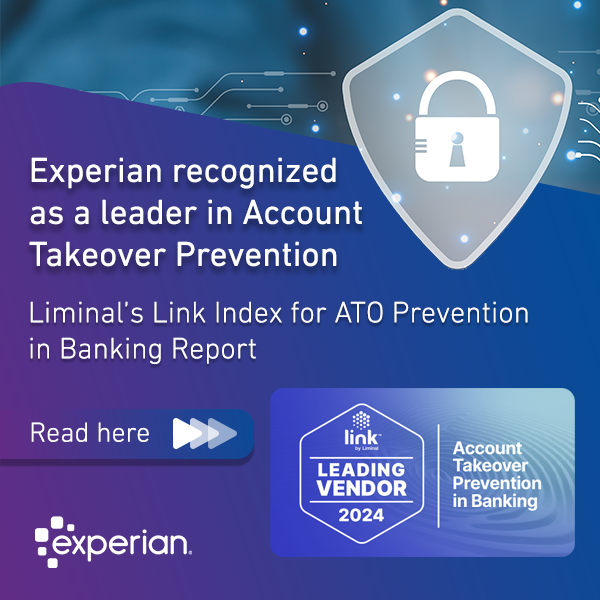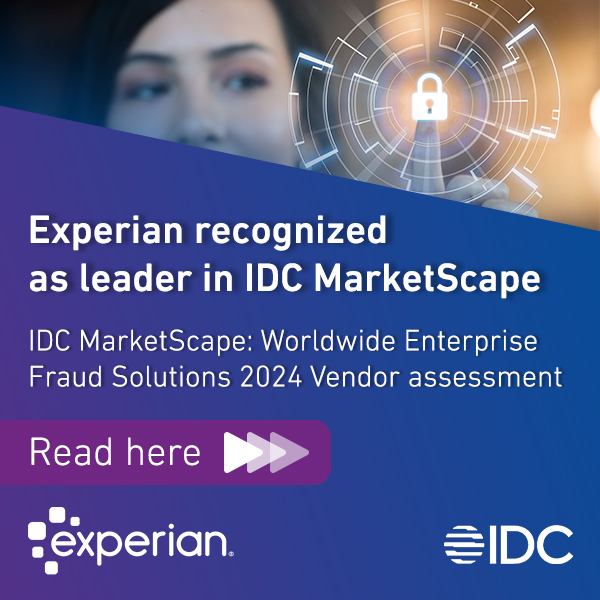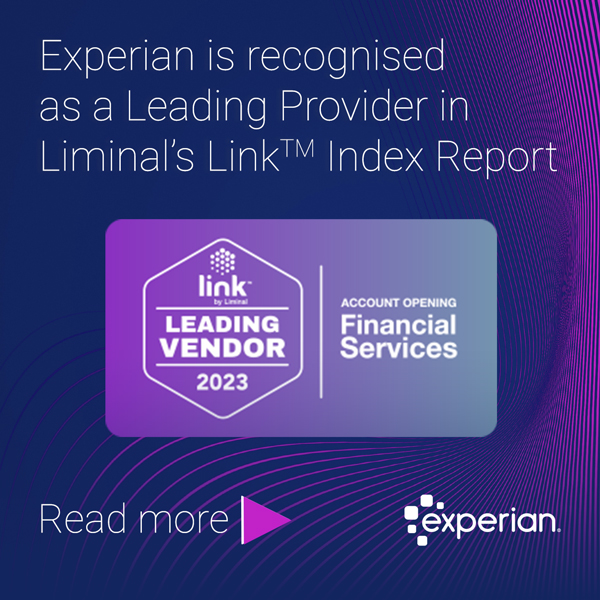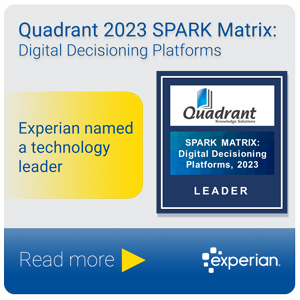Latest Posts

Juniper Research’s latest digital identity leader board predicts a big shift in the market – identity and fraud are now becoming synonymous. Experian’s position as number one vendor on Juniper Research’s leader board demonstrates why Experian’s flagship digital identity and fraud platform, Crosscore, is central to the future of identity and fraud management. “We’re thrilled Juniper has positioned us as the top provider of digital identity,” said David Britton, Vice President of Global Strategy for Digital Identity & Fraud at Experian. “Being able to accurately identify a customer in a digital transaction helps our clients provide a better customer experience and prevent fraud. Fighting fraud and reducing risk, while enabling great consumer experience is at the heart of Experian’s mission to make the digital world a safer place, even as cybersecurity rises as a worldwide threat.” Digital identity’s convergence of identity verification and fraud detection presents both opportunities and challenges for businesses, all in direct response to new consumer demands for a seamless, safe and uninterrupted digital customer journey. Key digital identity market Takeaways – Juniper Research Identity and Fraud Are Becoming Synonymous Trust is not a transactional feature of a digital identity system between identity creators and identity subjects, but rather, it is an inbuilt part. Given the unprecedented impact of the COVID-19 pandemic on eCommerce volumes, the advent of remote/hybrid working and the demand for eGovernment services, digital identity’s tie with privacy and security has become much more visible. An ever-increasing number of fraudulent activities highlights the need to ensure customer security and protection of personal and businesses data for integrity of digital identity systems. Fraud and digital identities are closely intertwined, also because preventing fraud involves getting the right identity datapoints, understanding their significance and acting upon the related findings. Governments Will Ramp Up Their Digital Identity Efforts Government regulations and initiatives around digital identity are a vital force shaping the market landscape. Success of eGovernment services is largely dependent on a mechanism of identifying citizens/users in an assured manner, usually via striving to create trusted identities. Even prior to COVID-19, governments around the globe were employing digital identity-related initiatives in areas other than eGovernment services, such as border controls and telehealth. Compelled by the challenges faced in terms of cybersecurity and citizen trust in identity initiatives, governments will increasingly collaborate with third-party vendors to come up with solutions with better usability and security. Identity Verification Use Cases and Underlying Technologies Will Continue to Dominate the Market Verification is one of the key areas affecting the digital identity market, mostly owing to the catalyst power of the pandemic digitalising transactions across all industries and business verticals. The solutions and use cases of digital identity verification (ie, login, anti-fraud, and decentralised identity) are numerous, as secure and convenient customer onboarding has been at the forefront of any critical digital engagement. These use cases and underlying technologies, such as biometrics, lend themselves to different industries and verticals and so, they will continue to enjoy customer uptake for the foreseeable future. Read now: Juniper Research Digital Identity Competitor Leaderboard Related content: Defining digital identity on the back of the ‘big digital shift’ What is digital identity and why should we care? Stay in the know with our latest research and insights:

The ecosystem of credit lending platforms and technologies has rapidly grown in the past year. Lenders now find themselves in an increasingly competitive market with new players emerging on the scene. More companies now have access to advanced analytics and automation capabilities, and this is helping businesses improve the accuracy and inclusivity of consumer lending decisions – a giant step toward achieving their growth ambitions. Our recent research shows that one of the top priorities for businesses has been to invest in new artificial intelligence and machine learning models for smarter customer decisions. But how effective is building new AI models without considering the data? What is data-centric AI? Building AI models on fixed data has already become an outdated approach. But by coupling data with the best model, better outcomes can be achieved. The concept of data-centric AI was coined by leading thinker in the AI space, Andrew Ng. Ng believed that models in production are only as good as the point-in-time data used to build them. As businesses continue to receive new data, this data needs to feed back into the model if it’s going to continue delivering the best results. This continuous loop of enriching the model with new data can be applied across use cases. The value of data-centric AI models for acquiring new customers By using the latest available data, rather than from 6-12 months ago or longer when the model was originally developed, data-centric AI models can: • More rapidly account for changes in the economy and consumer finances • Reach under-represented populations and provide greater access to credit • Take advantage of newly available types of information from data providers The value of data-centric AI in existing frameworks More observations AI is often limited by the data that was used to create the model. By using a more fluid open-source alternative, different data sets can be inputted to get more observations based on different characteristics and findings. For example, if a business wants to acquire a new type of customer, traditional AI would require a new model with new data sets to be in order to target this new customer. With data-centric AI, businesses can use an existing model and simply expand the data, thus allowing the model to work far more efficiently and target a new consumer base. It is a shared view that businesses should not build models with just their own data, because those data sources are too limited. At the very least, businesses want to combine data with a peer sample. However, an even better way is to use hybrid data sets in order to get the most observations. Data-centric AI makes that process easy without the need to create different models to see different outcomes. Up-to-date data The world is in a state of flux—populations change, people change. This means that the data pools AI models draw on may be compromised, no longer relevant, or have new meaning over time. It’s important to keep AI data sets recent and up to date, and not assume that the models used two years ago still apply today. For AI models to operate efficiently they need current, relevant data. Having a data-centric approach and sweeping through collected observations is essential for any business relying on their AI solutions. Businesses must have processes to understand and test their data to be sure the values are still adding up to what they should be. Being disciplined about data hygiene, all the way back to the source, is a necessity. Enriched and expanded data With model-centric AI, businesses are limited by the data they start with. Data-centric AI makes it possible to expand on the current customer base, which already includes data on customer attributes, with new potential customers that might mimic characteristics of a business's current base. Expanded data can also play a role with financial inclusion and credit worthiness. Having a low credit score does not necessarily mean the consumer is a bad risk or that they shouldn't be allowed access to credit—sometimes, it could mean there is simply a lack of data. Expanding data to include varied sources and adding it to current models without changing their structure, enables businesses to provide credit for individuals who may not have originally been accepted. This new approach in AI is creating solutions that are far more inclusive than previously possible. Data has massively expanded and is constantly evolving. By using data combined with advanced analytics, such as AI, there will be more sophistication in the observations that come from the data. This will allow businesses to better decide what data they choose to rely on while ensuring accuracy. By using expanded data sources, the outcomes of models are changed, leading to more inclusive models better fit for decision making and improving performance. "Models in production are only as good as the point-in-time data used to build them." Andrew Ng Infographic: Why data-centric AI leads to more accurate and inclusive decisions Stay in the know with our latest research and insights:

Global fraud predictions for 2022, plus a closer look at regional fraud trends. Stay in the know with our latest research and insights:

During the week of International Womens' Day, we shine a spotlight on the women thought leaders across Global Decision Analytics. In this Every Woman Forum, Tech Hub article, Angela Beteta Quesada, Principal DevOps Engineer, Global Decision Analytics, discusses the importance of relatable role models for women in the tech industry and how making the right choices in where and how you work can open up a wealth of different people to learn from. "As a role model I think I am relatable; I like to take risks and opportunities that are a challenge to me — and that I think are going to be good fun. That is how my whole career has developed. I also work well with people and have good communication skills — when I was a junior Java engineer, my mantra was ‘leave it with me’. I think my managers saw that they could throw things at me and have confidence that there was going to be a good result, which is a mindset I still have." Read the article to find out: How important were relatable role models at the start of your tech career? What makes an effective role model, and why? What do you feel young women at the beginning of their career can see in you that will be useful to take with them in their career? How important is it to see more role models combining the realities of motherhood and a high-pressure career? What advice would you give to a young woman starting her career in tech? Do you still look for role models in your own career? Stay in the know with our latest research and insights:

During the week of International Womens' Day, we shine a spotlight on the women thought leaders across Global Decision Analytics. In this Juniper Research interview, Kathleen Maley, VP of Analytics Product Management talks about the current state of data analytics, with the backdrop of Juniper Research's Future of Digital Awards and its recognition of AIS. Watch the video to discover: Current problems with data analytics Broad nature of activities of what is now defined as analytics Model development, model scoring, model regulatory control, model risk management and model deployment Where is data coming from - is it clean and do we understand it? Importance of humans in the development of algorithms Lack of data - where do we need to close gaps? How does looking at the past help with looking to the future - the importance of current/real-time data The expense of maintenance - tech stack - there are now alternatives Democratization of data - expanding credit access by using non-traditional sources of data Talent shortage of data scientists - low-code and no-code Extracting data value for businesses when data is ever-expanding Stay in the know with our latest research and insights:

Did you miss these February business headlines? We’ve compiled the top global news stories that you need to stay in-the-know on the latest hot topics and insights from our experts. Credit card fraud jumps to a five-year high The Mail Online covers why, according to Experian, cold-calling, text scams and crypto fraud will rise in 2022, while also pointing to a rise in fraudulent credit card applications, particularly during the busy Christmas period. The future of fraud: How digital dependency creates infinite opportunity for scammers In this Forbes article, David Armano writes about the futuristic nature of Experian's Future of Fraud Forecast for 2022, and why digital transformation has created new opportunities across the fraud landscape. Your digital impression is your first impression, here's how to make it count Inc.com looks at why your digital first impression is the new first impression, and what you can do about it. Read about the four areas to focus on to put your best foot forward digitally in 2022. The markets, Ukraine, cyberthreats, and supply risks In this episode of The Tape podcast, David Britton, Global Strategy for Identity & Fraud at Experian, talks about internet fraud and how it affects consumers and businesses. Fraud suspicions have a record high in 2021 in Brazil, says Serasa Last year Brazil had 4.1 million transactions suspected of fraud, according to the Serasa Experian Fraud Index. Read about what type of fraud threats are included, and what 2022 might look like across the fraud landscape. Stay in the know with our latest research and insights:

The pandemic may have accelerated digital transformation across the world of financial services , but behind the scenes, banks and lenders still face a significant tech debt, and many organizations are committed to continuing the innovation. That's for good reason. Today's consumers increasingly expect a digital-first customer experience. The days of visiting a local bank branch to access financial services and products are fading away. Fintechs have risen to the occasion, transforming the market and meeting the growing digital demand. For traditional banks and lenders, waiting to innovate is no longer an option—it's a must to remain competitive. So what comes next? Here's a look at the technology trends that stand to impact and transform financial services as we advance. 1. The rapid rise of low-code/no-code solutions According to a recent survey from TechRepublic1, nearly half of companies are already using low-code/no-code solutions (LCNC). The same report also notes that among companies not using LCNC solutions, one in five plans to begin within the year. The driving force behind this trend is the global shortage of digital skills, from software development to data analytics to information security. The pool of technical talent has long been smaller than the demand, and the Great Resignation has only exacerbated the problem. For instance, 75% of software developers2 report they're currently looking for other jobs. Amidst this ongoing talent shortage, there's another stressor—the need to deploy technology products to market faster and faster. LCNC solutions answer these challenges by making doing so easier and quicker. The technology democratizes software development, allowing business users—or citizen developers—in different functions to design and deploy applications. With the skills gap likely to continue, the interest in LCNC solutions will too. LCNC solutions enable financial institutions to keep pace with technology changes and meet the digital demand, even with limited technical resources. 2. Leveraging data will require adding value—and engendering trust Financial service organizations have used advanced data analytics to provide consumers with more personalized products. And consumers have been on board as long as they see the benefit. For example, a 2021 consumer survey by Experian showed that 42% of consumers would share personal data, and 56% would share contact information, if it improves their experience. However, this research speaks to growing tension between consumers and financial service providers. The first want more personalized services, but they are also more selective about which companies they share data with. Consider a recent McKinsey study that revealed that 44% of consumers don't fully trust digital services3. As we advance, organizations that want to build and keep consumer trust will need to be thoughtful about the data they ask for and increasingly transparent about how they plan to use it. 3. Doubling down on AI but looking for ROI in the process AI has proven helpful in multiple ways, from powering recommendation engines and chatbots within the retail world to improving fraud analysis and prevention in the banking industry. But there's still so much more organizations can do, especially with the AI they already have. Financial service and fintech companies have funneled massive resources into AI solutions. However, only 20% of AI models4 are ever used in widespread deployment. What’s more, the current average return on AI investments hovers around 1%. This year, expect to see more organizations examining the ROI of AI-powered technology and looking to get more from the investments they've made. Technology partners can help by identifying additional opportunities for AI models to drive customer engagement, validate credit scoring, and protect businesses against fraud. 4. Banking-as-a-Service will yield even more choices and more competition There have long been high barriers that protect traditional financial service organizations from much new competition. But the advent of open APIs and Banking-as-a-Service (BaaS) is knocking these barriers down, yielding a considerable influx of startups that provide banking-like services. And this wave of new fintech has captured consumer interest. Consumers have shown that they’re willing to try financial service products from an array of providers; they're not married to sticking with traditional banks. In fact, 27% of global consumers5 have relationships with neobanks, and 40% report using financial apps6 outside of their primary banking app. However, the gold rush towards BaaS will yield a few winners and a lot of losers. The question for the near-term is who will survive in this crowded market. Consumers will also begin to figure out what makes sense in terms of how many financial organizations they want to connect with and when to say enough is enough. 5. Embedded finance is the new black in retail In a similar theme, the influx of embedded finance products into retail experiences continues to gain traction. There's only more to come. Multiple leading retailers, both longstanding and new D2C brands, have incorporated Buy Now Pay Later (BNPL) payment options into their checkout process, and shoppers are rapidly adopting these new payment methods. One-third of consumers report they've used BNPL before7. Though the payment method still lags far behind other forms of credit, awareness of BNPL and other embedded finance solutions is rising, especially among younger consumers. Looking forward, expect to see embedded finance make inroads not only with more retailers but also across other industries such as hospitality or entertainment. These pressing tech trends are reshaping financial services. In the process, they're bringing new solutions to consumers and new opportunities to banks and non-traditional lenders. Organizations that keep pace with these trends will lay the foundation for their next generation of customers as well as the future of their business. More 2022 trends and predictions Stay in the know with our latest research and insights: 1.TechRepublic Survey: Low-code and no-code platform usage increases 2.Stack Overflow: The Great Resignation is here. What does that mean for developers? 3.McKinsey: Are you losing your digital customers? 4.ESI ThoughtLab: Driving ROI through AI 5.EY: How can banks transform for a new generation of customers? 6.Axway: Consumers are starting to sense an open banking transformation 7.PYMNTS.com: No slowdown in sight for surging BNPL as consumers want it, retailers need it

Steve Wagner, Managing Director, Global Decision Analytics on Redesigning the future of consumer lending with data and analytics. Find Steve Wagner's interview in Raconteur's Future of data report to discover what businesses need to do to succeed in an increasingly digital world. “The good thing is that technology and data now allow businesses to put the customer journey at the heart of what they’re doing. With the advanced technologies available today, businesses can access relevant data and deliver on customer expectations in their moment of need. Whether it’s access to a loan or mortgage, or to consolidate debts, a real-time view of the consumer is possible.” Read the full article and find out about: Why the digital customer experience, enabled by both data and analytics, is the new battleground for many industries. Consumers reporting they were online 25% more in 2021 compared to a year before. Online retail sales saw four years of growth in just 12 months during the Covid pandemic. Demand for frictionless journeys through biometrics or multimodal authentication mean customers can see the value exchange in sharing personal data. Behavioural biometrics is the next frontier in tackling fraud and providing a seamless customer journey. Technology is allowing us to analyse far more data sources in real time, providing a comprehensive picture of an individual. Open Banking and the democratisation of data are part of the progressive change around data. Importance of extracting the insight lenders and fintech providers need to implement the best customer journey and make the best decisions. Businesses can make credit-risk decisions using automation and advanced analytics. This will lead to more opportunities for credit and better financial inclusion. Harnessing the power of 'insight everywhere' for better knowledge bases. "The application of advanced analytics, artificial intelligence and machine learning is allowing businesses to tailor their services to an audience of one - at scale." Stay in the know with our latest research and insights:

*Stats from Experian Global Insights Research Read related content The evolution of data: Unlocking the potential of data to transform our world Be more open: Results of the 2021 Open Banking survey - Experian Academy Full text: The future of consumer lending in a digital economy With the advanced technologies available today, businesses can access relevant data and deliver on customer expectations in their moment of need. As more people go online and use digital channels, your business must do more to create a seamless and secure experience. Online activity has increased by 25% globally Online retail sales saw 4 years of growth in 12 months Now online, consumers have high expectations for digital experience without sacrificing security, convenience, and privacy. 64% of consumers have abandoned an online transaction in the past 12 months Consumers, regardless of age, now prefer online banking and payments over in-person transactions The future of credit and fraud risk management is integrating data and technology seamlessly to put the customer at the centre of it all. 74% of businesses are adopting AI (2021), up from 69% the year before Businesses can embrace customer-centricity at scale through: Behavioural biometrics within a layered strategy of defence to make it easier to tackle fraud and maintain a seamless customer journey Open source data so businesses of all sizes can build a view of potential customers, minimise credit risk, and bring more people into mainstream financial services Advanced analytics, AI, and machine learning for real-time underwriting, fraud detection and a truly personalised service “The market is now driven by consumer demand for digital services. Those companies that are able to tailor the digital customer journey – so it reflects the best-in-class consumer experience – are the ones that will win.” – Steve Wagner, Managing Director of Global Decision Analytics

Steve Yin, SVP of Global Identity and Fraud Product Management, talks to Juniper Research about what it means to be recognised through Juniper Research's Future of Digital Awards for innovation in fraud detection and prevention. Watch the video to find out about: The shift in trends across fraud Impact of the increase in online traffic How those who are new to digital can be more susceptible to fraud New or expanding merchants Education for consumers on secure digital interactions What's new in fraud detection and prevention? Models to detect known types of attack vectors Predictive: new signals and awareness of emerging threats CrossCore platform capabilities Stay in the know with our latest research and insights:

Did you miss these January business headlines? We’ve compiled the top global news stories that you need to stay in-the-know on the latest hot topics and insights from our experts. Next-gen AI analytic apps in credit In this Lendit Fintech webinar about the future of AI analytics in credit, Srikanth Geedipalli, SVP of Global analytics and AI, joins a panel of experts to explain how Experian deals with delinquencies and retains customers using a proactive approach. A successful DevOps strategy is more than just technology Dr Mark D. Spiteri writes on the Forbes Technology Council about how Experian has embraced DevOps culture to not only improve internal IT processes, but also to reshape the mindset of product development teams. 7 payments trends for 2022 as innovation climbs David Bernard, SVP Global Decision Analytics, talks to Payments Dive about cross-border services, BNPL and cybersecurity tools, and how there will be no shortage of innovation and competition in the payments industry as businesses and their regulators shape new digital tools. Deepfakes – the good, the Bad, and the ugly In this Forbes article, Eric Haller, VP & General Manager, Identity, Fraud & DataLabs, talks about how the creation of deepfakes can be thought of as the latest development in the ongoing battle between business and counterfeiting. Stay in the know with our latest research and insights:

Dr Mark D. Spiteri writes on the Forbes Technology Council about how Experian has embraced DevOps culture to not only improve internal IT processes, but also to reshape the mindset of product development teams. What is DevOps? DevOps is the hybrid of development operations - a combination of software development and IT operations that shortens the product lifecycle and delivers a higher quality operational performance, benefiting the company and customer alike. The shift towards a service-centric culture As tech businesses move away from on-premises, product-centric culture, they are seeking alternatives that enable a service-centric approach. DevOps helps to do this by expanding upon agile and lean software development principles that ultimately lead to a cultural shift towards SaaS. The goal is to improve efficiency and accelerate the distribution of product enhancements, but it's all in the integration of these new ways of working. "It’s not a question if DevOps can help your company upgrade its product cycle; it’s a question of how well you can implement it into your organization." Foundations of DevOps People: Small, autonomous teams with a focus on collaboration and achieving system-orientated outcomes. Processes: End-to-end agile, lean practices for rapid IT service delivery. Technology: Automation tools that make the complete flow and pipeline of development and testing repeatable and reliable. "Improving the DevOps process can make a sea of change across every part of your product’s lifecycle, and what’s most fascinating is that the most important elements do not require a huge IT investment." Read the full article Stay in the know with our latest research and insights:





